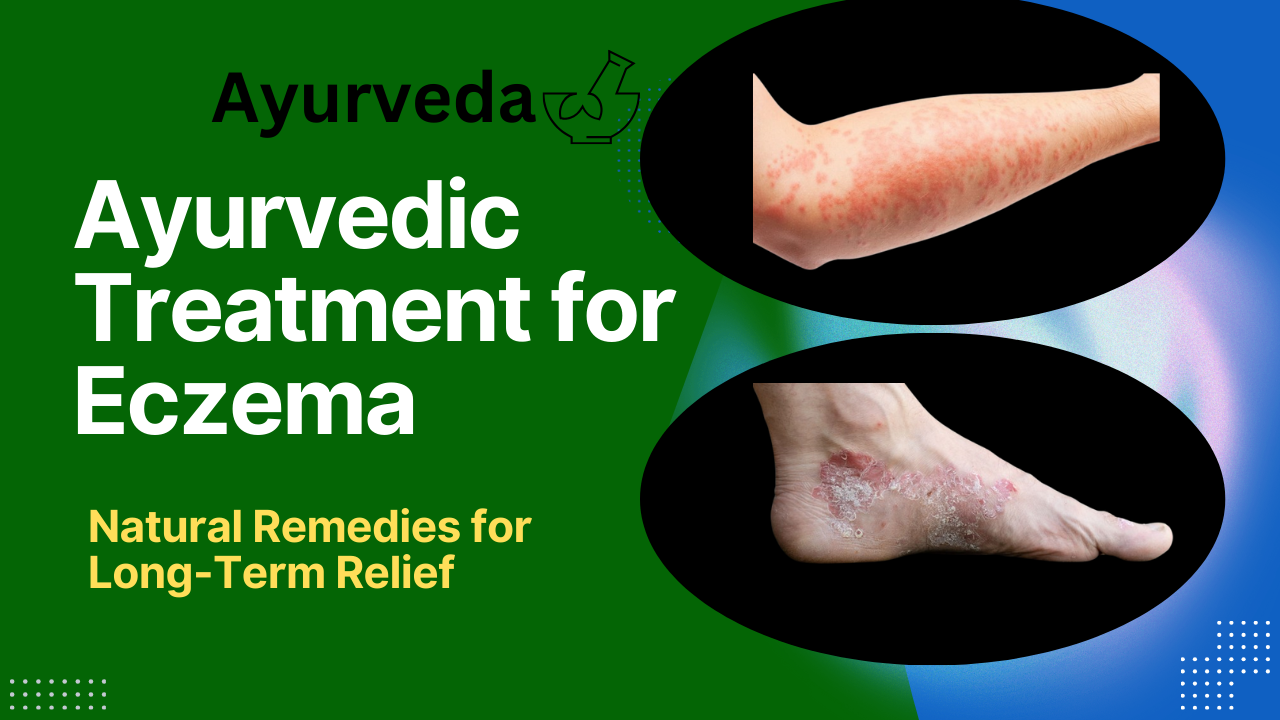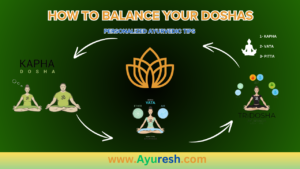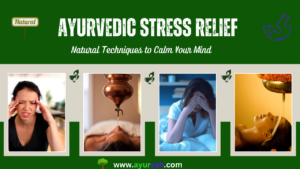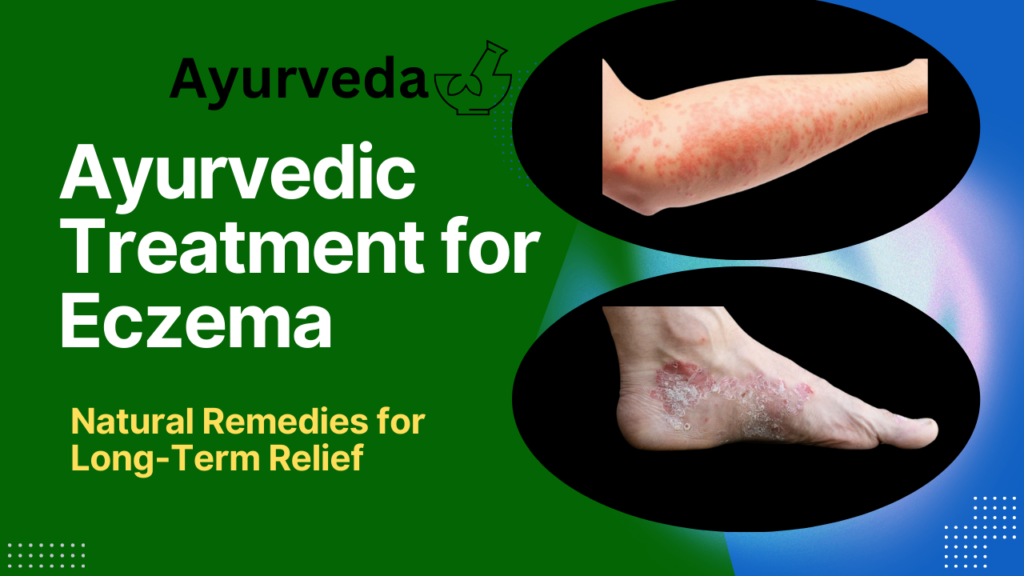
Ayurvedic Treatment for Eczema
Eczema, also known as atopic dermatitis, is a chronic skin condition characterized by red, inflamed, itchy, and dry patches of skin. It can be a frustrating and often debilitating condition, affecting both children and adults. While conventional treatments like corticosteroids may offer temporary relief, they often come with side effects and may not address the root cause of the problem.
Ayurveda, the ancient system of natural healing from India, offers a holistic approach to treating eczema by addressing the root cause of the condition and promoting long-term relief. In Ayurveda, eczema is primarily seen as an imbalance of the body’s doshas—Vata, Pitta, and Kapha. This approach includes lifestyle changes, herbal remedies, dietary adjustments, and external therapies that work together to restore balance and heal the skin from within.
In this comprehensive blog, we will explore Ayurvedic treatment for eczema, how it works, and the best natural remedies to provide lasting relief.
Table of Contents
What is Eczema in Ayurveda?
According to Ayurveda, eczema falls under the category of Vicharchika, a type of skin disorder that occurs due to imbalances in the doshas, primarily Pitta and Kapha. Pitta represents the fire element in the body, while Kapha is associated with water and earth elements. When Pitta is aggravated, it leads to inflammation and redness, while an imbalance in Kapha results in excessive moisture, swelling, and oozing from the skin.
In addition, Vata dosha, which represents the air element, may contribute to the dryness and itchiness commonly associated with eczema. Therefore, Ayurvedic treatment for eczema focuses on balancing these doshas to reduce inflammation, relieve itching, and heal the skin naturally.
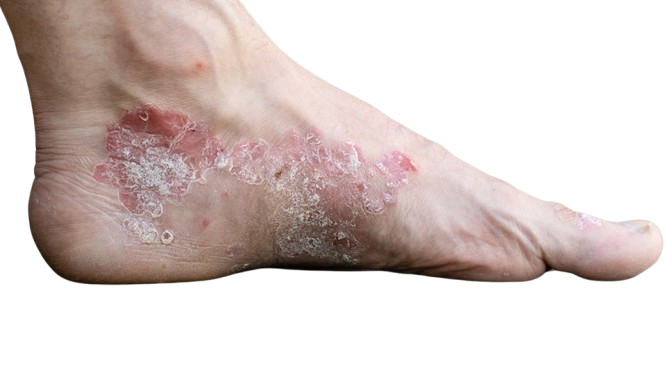
Ayurvedic Causes of Eczema
Eczema is seen as a result of an internal imbalance in the body, which can be triggered by various factors:
- Unhealthy diet: Consumption of spicy, oily, and processed foods can aggravate Pitta dosha, leading to inflammation.
- Stress: Mental and emotional stress can disturb the doshas, especially Vata, which can worsen eczema.
- Improper digestion: Poor digestion leads to the formation of ama (toxins) in the body, which can accumulate in the skin and trigger eczema flare-ups.
- Environmental factors: Exposure to allergens, pollutants, and harsh weather conditions can irritate the skin and contribute to the development of eczema.
- Genetic predisposition: Eczema can also have a hereditary component, but Ayurveda believes that balancing the doshas can still provide relief.
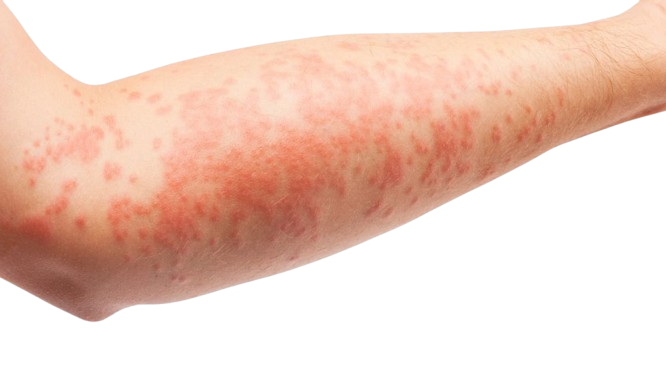
Ayurvedic Treatment for Eczema: Key Principles
The Ayurvedic treatment for eczema involves a multi-faceted approach that aims to detoxify the body, balance the doshas, and promote healing. The following are the key principles of Ayurveda in managing eczema:
1. Detoxification (Panchakarma)
Detoxification is an essential part of Ayurvedic treatment for eczema. Panchakarma, a specialized detoxification therapy, helps eliminate toxins (ama) from the body and restore balance to the doshas. Common detoxification methods include:
- Vamana (Therapeutic vomiting): Helps expel toxins from the upper digestive tract.
- Virechana (Purgation): Cleanses the liver and intestines, reducing inflammation in the body.
- Raktamokshana (Bloodletting): A specific therapy used to purify the blood and reduce skin disorders.
2. Herbal Remedies
Ayurveda uses a wide range of herbs that have anti-inflammatory, anti-itching, and cooling properties to treat eczema. The following herbs are commonly used in Ayurvedic treatment for eczema:
- Neem: Known for its antibacterial and anti-inflammatory properties, neem helps soothe irritated skin and reduce itching.
- Turmeric: This powerful anti-inflammatory herb helps reduce redness and swelling associated with eczema.
- Manjistha: An excellent blood purifier, Manjistha helps detoxify the skin and reduce flare-ups.
- Khadira: A cooling herb, Khadira balances Pitta and helps soothe inflamed skin.
These herbs are often consumed as powders, decoctions, or applied topically as herbal pastes or oils.
3. Dietary Changes
In Ayurveda, diet plays a crucial role in treating eczema. An anti-inflammatory diet that balances the doshas is recommended. To balance Pitta and Kapha, avoid spicy, oily, and fried foods, as well as processed and refined foods. Instead, focus on:
- Cooling foods: Cucumber, melons, leafy greens, and fresh fruits help balance Pitta and reduce inflammation.
- Bitter and astringent foods: These help cleanse the blood and reduce itching. Include foods like bitter gourd, fenugreek, and turmeric.
- Healthy fats: Ghee (clarified butter) and coconut oil nourish the skin from within and reduce dryness.
Additionally, staying hydrated is essential for keeping the skin healthy and reducing dryness.
4. External Therapies
Ayurveda offers various topical treatments that help soothe the skin, reduce inflammation, and promote healing. These include:
- Aloe Vera: Applying fresh aloe vera gel on the affected areas helps soothe itching and reduce redness.
- Coconut oil: A natural moisturizer, coconut oil can be applied to dry and inflamed areas to lock in moisture and prevent cracking.
- Turmeric paste: A paste made from turmeric and water can be applied to itchy areas to reduce inflammation and promote healing.
- Herbal oils: Oils such as neem oil, sesame oil, or medicated oils like Kumkumadi tailam are applied to the skin to provide nourishment and reduce dryness.
5. Lifestyle Modifications
Ayurveda emphasizes the importance of a healthy lifestyle in managing eczema. Simple lifestyle changes such as maintaining a regular sleep schedule, practicing yoga, and incorporating stress-relief techniques like pranayama (breathing exercises) and meditation can help balance the doshas and reduce eczema flare-ups.
6. Stress Management
As stress is a significant trigger for eczema, Ayurvedic treatment for eczema includes stress management techniques such as yoga, meditation, and Abhyanga (self-oil massage). These practices help calm the mind, balance Vata, and promote overall well-being.
Ayurvedic Remedies for Eczema
Several Ayurvedic remedies can be used for managing eczema naturally. These include:
Herbal baths: Soaking in a bath infused with neem leaves, licorice, or turmeric can help calm the skin and relieve itching.
Neem leaves: Boil neem leaves in water and use the solution to wash the affected areas. Neem’s antibacterial properties can help reduce itching and inflammation.
Turmeric paste: Mix turmeric with water or coconut oil to form a paste and apply it to the inflamed areas. This remedy helps soothe the skin and reduce redness.
Coconut oil: Applying pure coconut oil on the skin helps moisturize and reduce dryness, preventing flare-ups.
Conclusion
Ayurvedic treatment for eczema provides a natural and holistic approach to managing this chronic skin condition. By focusing on balancing the doshas, detoxifying the body, and using herbal remedies, Ayurveda offers long-term relief from the symptoms of eczema without the side effects of conventional treatments. From personalized diets to topical treatments and stress-relief techniques, Ayurveda addresses both the root cause and the symptoms of eczema. For those looking for an alternative to conventional treatments, Ayurveda offers a gentle and effective path to healthier, clearer skin.
FAQs About Ayurvedic Treatment for Eczema
1. How long does Ayurvedic treatment take to show results?
Ayurvedic treatments take a holistic approach to healing, and the results may take some time to become noticeable. Depending on the severity of eczema, it may take a few weeks to a few months for visible improvement.
2. Can I use Ayurvedic treatment alongside conventional medicine?
Yes, Ayurveda can complement conventional medicine, but it is always advisable to consult both an Ayurvedic practitioner and your regular healthcare provider before combining treatments.
3. Are there any side effects of Ayurvedic treatments for eczema?
Ayurvedic treatments use natural herbs and therapies, which generally have no side effects. However, it’s crucial to get a proper diagnosis and treatment plan from an experienced Ayurvedic practitioner to ensure safety.
4. Can Ayurveda cure eczema permanently?
Ayurveda focuses on addressing the root cause of eczema and restoring balance to the body. While it may not “cure” eczema entirely, it can help manage symptoms and reduce the frequency and severity of flare-ups.
5. What foods should I avoid during Ayurvedic treatment for eczema?
During Ayurvedic treatment for eczema, it is essential to avoid spicy, oily, fried, and processed foods that aggravate Pitta and Kapha doshas. It’s also important to minimize dairy, sugar, and caffeine intake.
6. How can stress affect eczema, and what are Ayurvedic remedies for it?
Stress is a significant trigger for eczema, as it aggravates Vata dosha. Ayurvedic remedies for stress relief include practicing yoga, meditation, and using calming herbs like Ashwagandha and Brahmi to balance the mind and reduce eczema flare-ups.


